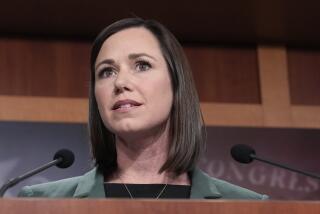4 Citizens Tell Panel of Pocketbook Woes : Economy: ‘Everything is going backward,’ one member of middle class says to senators. Experts later confirm grim picture.
- Share via
WASHINGTON — Putting a human face on economic distress, four middle-class witnesses told the Senate Finance Committee on Friday how they are having trouble making ends meet. The lawmakers are considering proposals for tax cuts that would earmark most benefits for working families.
In contrast with the customary practice of listening to experts or advocates for special interest groups, the panel invited four ordinary Americans to describe their pocketbook woes during the faltering recovery from recession.
“We’re not getting anywhere,” said Nancy McKenna, a working mother of two from Cliffside Park, N.J., who is married to an electrician. “Everything is going backward.” She said her son was unable to get a college loan because their income was too high but they could not afford to pay his tuition, either.
College-educated Vicki L. Yancey, whose husband has a master’s degree in business administration, said both are working and her two children are in day care so they can afford a home in middle-class Springfield, Va., a suburb of Washington.
“At this time, my husband and I have no savings, a home that has decreased in value, and we wonder where we will get the money to send our children to college,” she said. “When two paychecks are not enough, then what?”
Antoinette T. Cusella, a legal secretary from Cleveland, said she would like to tap the money she has saved in an individual retirement account to buy her first home but is barred from doing do by IRA restrictions. She asked for a change in the law to permit a withdrawal for home purchases without penalty.
But she strongly opposed a reduction in capital gains taxes, saying: “These proposals that start at the top and trickle down never seem to reach the middle class.”
The most moving testimony came from Paul Cohen, a 51-year-old Philadelphian who lost his job as a supermarket department chief last March and has not been able to find work since despite an intensive search.
“I had no idea how bad it would be out there,” said Cohen. “I am scared to death.” He said he had to go on welfare for the first time before he started receiving extended jobless benefits and is now concerned that he will not be back on a payroll before the extra payments expire on Feb. 22.
Sen. Donald W. Riegle Jr. (D-Mich.), responding to Cohen’s plight, said: “It’s an absolute outrage and it’s got to change.”
Sen. David L. Boren (D-Okla.) said he favored a federal program to provide public construction jobs as a last resort, adding: “People want to work.”
Expert witnesses later painted a grim picture of economic conditions that confirmed some of the fear and frustrations of the four representatives of the middle class.
Allen Sinai, chief economist for The Boston Co., put it this way:
“There is no recovery from the recession in the United States economy. It increasingly appears there may never have been any meaningful recovery. Worse, whether the economy recovered or not, it may now be entering a secondary downwave. . . . Looking ahead, the earliest meaningful upturn that might occur now looks put off until at least March or April, and probably will be contingent on further easing (of credit) by the Federal Reserve and some fiscal help from Washington.”
Gary Burtless, a senior economist at the Brookings Institution, added: “The long economic expansion of the 1980s did not bring fatter paychecks and higher living standards to most workers. Instead, it brought a continuation of the slide in real wages that began in the mid 1970s.”
Meanwhile, President Bush said in remarks to the National League of Cities that he understood the widespread apprehension about the economy even among those who have a job.
“These are tough times,” the President said.
Bush said he was going to propose again to Congress a consolidation of existing federal grants to local governments that would allow cities and towns a total of $15 billion to use as they see fit without any strings attached.
More to Read
Get the L.A. Times Politics newsletter
Deeply reported insights into legislation, politics and policy from Sacramento, Washington and beyond. In your inbox twice per week.
You may occasionally receive promotional content from the Los Angeles Times.










